- in Personality by Tony
- |
- 1 comments
The Good, Bad, And The Ugly Side Of Emotions
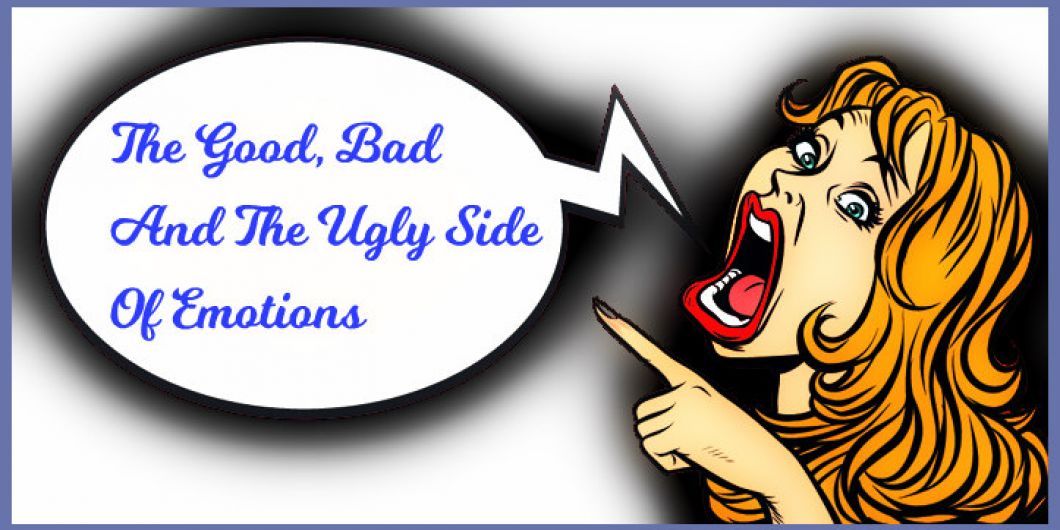
In psychology, emotion is often defined as a complex state of feelings that result in physical and psychological changes that influence thought and behaviour.
In other words, It impacts how we feel, believe, and behave, and it also plays a role in determining how we manage social situations and make decisions.
More...
Different Types of Emotions

We see these emotions in ourselves and others, and awareness is the key to controlling them. There are many ways to manage our feelings, including meditation, yoga, and mindfulness, and these techniques help us gain perspective and become aware of our emotions.
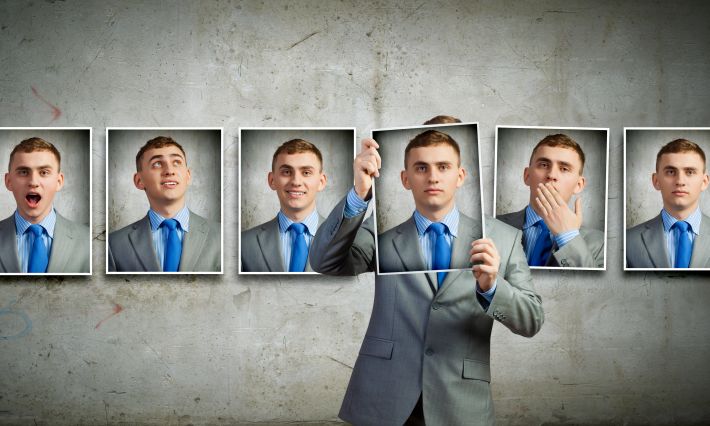
Emotions play a significant role in our lives and influence our mood, behaviour, and decisions. For example, they affect how we eat, sleep, exercise, and even how much we earn.
Emotional Intelligence

Emotional intelligence (EI) is the ability to recognise our emotional state and those of others and regulate them effectively.
Emotional intelligence helps us manage our moods, relationships, and performance at employment or school.
It turns out that emotions aren’t always rational.
For example, research has shown that angry people see things as black and white, whereas happy people see things in shades of grey. This means that the way we interpret information depends on our emotional state.
Therefore, our state of mind often impacts our moods, thoughts, behaviours, and decisions.
You can improve your life by understanding your emotions better. The Emotional wheel by Robert Plutchik identified eight primary emotions in polar opposite pairs to help you identify your feelings and their causes.
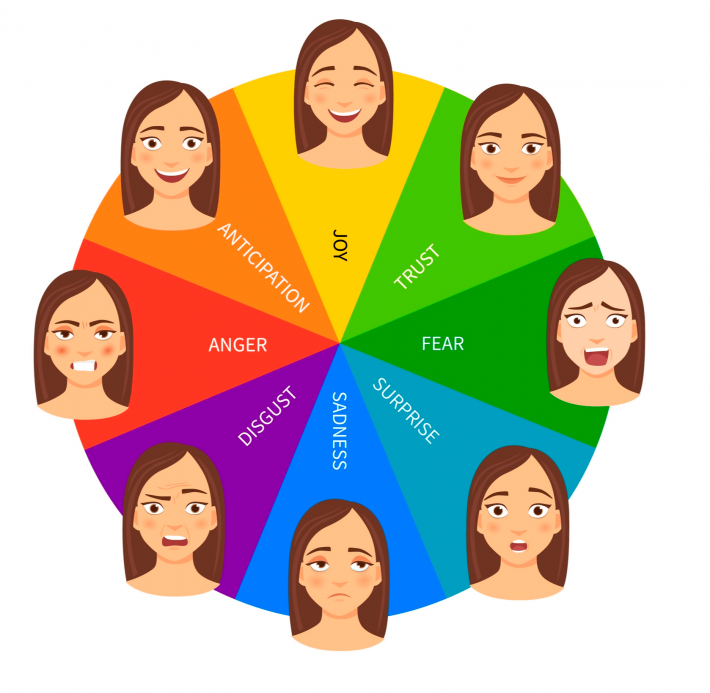
Each survival mechanism, from fight or flight, is linked to one of those eight primary emotions.
Ekman’s facial-expression research examined six basic emotions: anger, disgust, fear, happiness, sadness and surprise.
This tool can also help conflict resolution or describe your feelings to change your behaviour.
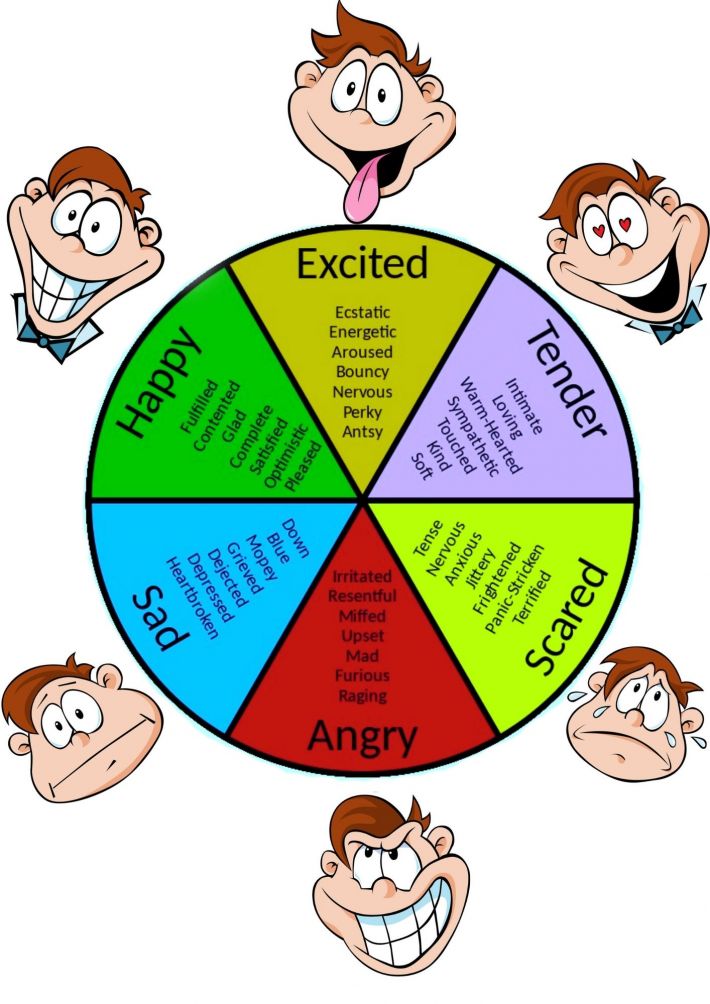
When you consider that emotions are mind events, not world events, we have more say in regulating them. For example, emotional obedience assumes our emotions represent the truth, the whole truth, and nothing but the truth and must, therefore, facilitates our behaviour, I’m scared; consequently I must run. I’m angry; therefore, I must fight.
Major Emotional Theories
The major theories of emotion can be grouped into three main categories:
- Physiological
- Neurological
- Cognitive.
Physiological theories suggest that responses within the body are responsible for feelings.
Neurological theories propose that activity within the brain leads to affective responses.
Finally, cognitive theories argue that thoughts and other mental activities are essential in forming emotions.
Whereas powerful emotions can cause you to take actions you might not typically perform or to avoid situations you enjoy.
Some believe that emotions have an evolutionary role in the survival of our species. Our ancestors needed to pay close attention to threats and hazards for thousands of years.
Missing clues about nearby wild animals or imminent adverse weather, for example, would have been a matter of life and death.
Hence, the brain can quickly recall previous signs of danger. So, it’s simply trying to help us to stay safe by keeping in mind, previous events from the past that proved to be in some way harmful.
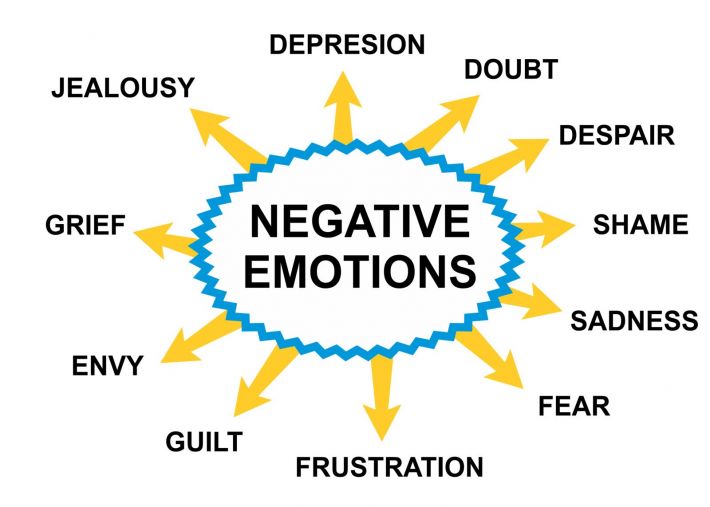
So, recalling negatives events is a natural response - Psychologists call this a negative cognitive bias, but one that’s not always helpful if it means you forget all the positives that have happened or if it influences your future actions (like giving up cycling after an accident or a painful fall onto the road).
Sometimes, negative thoughts are not always considered evil; taking on board constructive criticism, for example, it enables improvement and reflecting on differences of opinion leads to increased empathy and insight.
To live a happy and fulfilling life, we must learn how to handle negative emotions. The good thing is that we don’t have to struggle alone, and there are several ways to cope with negative emotions.
How does having a positive attitude affect our lives?
What role does happiness play in our relationships?
How can we change our emotions?
In as much as our thoughts dictate our feelings, our feelings determine our actions. In other words, we act according to our emotions and behaviours. When we feel good, we tend to behave positively and vice versa.
But what happens when these two elements clash? For example, imagine feeling sad because you lost a loved one. On the other hand, you are also feeling angry at someone who has wronged you. Now, which emotion will win out?
The answer lies in your beliefs and attitudes towards life. If you believe that life is full of ups and downs, you will experience both emotions simultaneously. This means you will have a negative outlook on life and thus, a negative attitude.
Are you struggling to cope with emotional issues or personal problems?
Are you tired of being sad, angry, depressed, anxious, stressed out and frustrated?
If so, you should learn to cope with these feelings.
How we deal with our emotions affects us on many levels. When we experience negative emotions such as anger, sadness, fear, frustration or stress, they affect our bodies physically.
Emotional responses such as anger and frustration can cause us to act impulsively or aggressively.
They can also trigger an emotional reaction from others, leading to conflict. Learning how to manage them better can help improve our overall physical and mental health.
How does your attitude affect your health?
The human body has a complex chemical reaction system that regulates our emotional state. When these chemicals are out of balance, they can cause us to experience negative feelings such as anxiety or depression.
Emotions significantly affect our overall well-being and influence our thoughts, behaviours, and actions. In other words, they shape who we are.
Good emotions

How often do you experience positive emotions?
Are they ideal for us?
Positive emotions such as joy, love, gratitude, hope, pride, amusement, awe, and wonder are essential to our well-being. They give meaning to life and provide a sense of purpose.
Positive emotions are associated with better healthy outcomes, improved immune function, reduced stress levels, increased productivity, and greater creativity.
In short, they are appropriate for us for health and wealth.
Bad emotions
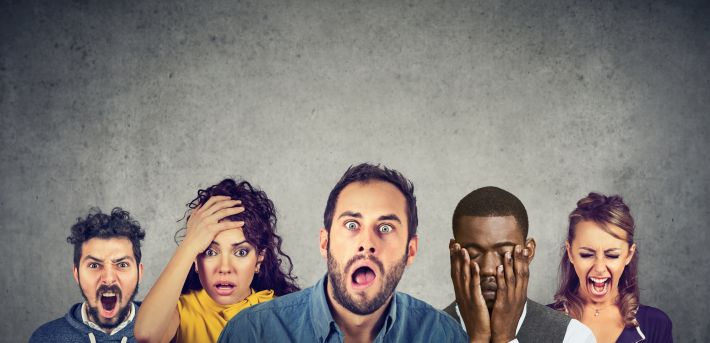
How often do you get angry or upset at someone else? If you answered yes, then you might want to take note.
Anger and frustration are normal human feelings and part of being human. However, they can also become unhealthy habits if you let them control you. Learn how to manage these negative emotions and stop letting them ruin your life.
Anger is a natural emotion that everyone experiences from time to time, and it helps us express our feelings and motivate ourselves to take action. But anger can also be destructive if you allow it to control you.
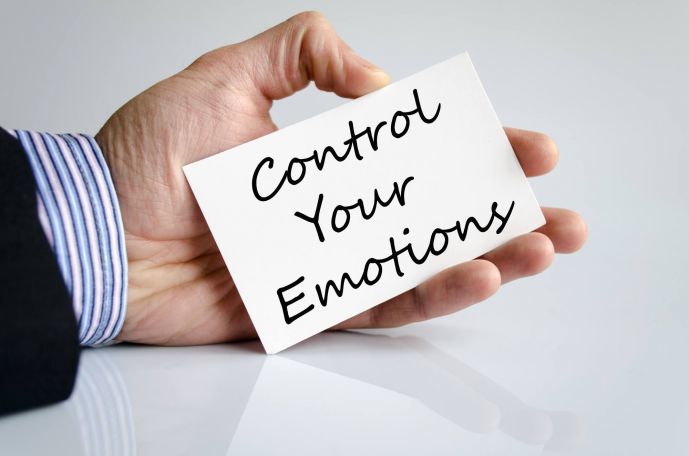
Negative emotions such as anger, fear, anxiety, guilt, shame, and envy can cause problems in our personal and professional lives. People who experience these emotions are called emotional beings.
And when they do not express their feelings appropriately, they risk social exclusion from others. Emotions play a crucial role in shaping our personalities and sometimes cause us to act in ways we would otherwise never consider.
Negative emotions are often triggered by situations or events we perceive as threatening. To cope with them, we tend to become defensive and react aggressively, leading to further escalation of the problem.
We all experience negative emotions from time to time. Sometimes they come out in our speech, sometimes in our actions, and especially in our body language.
Ugly emotions
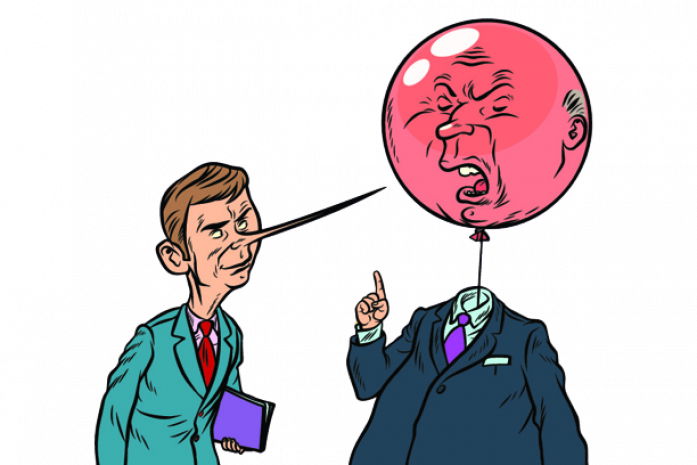
Ugly emotions are often associated with negative feelings such as anger, sadness, or fear. These emotions can cause us to act in ways that aren’t necessarily helpful. For example, they might make us lash out at someone who hurt our feelings or get angry when things don’t go our way.
Ugly emotions are generally triggered by something that happens in our lives. They can also arise from certain situations, such as being rejected or feeling lonely.
We tend to associate ugly emotions with bad experiences, which can also occur during positive events. Some research suggests that these emotions can even improve performance.
How often do you experience negative feelings such as jealousy or sadness?
These emotions are called ugly because they are unpleasant, but they don’t necessarily mean something terrible has happened. They are also normal mortal emotions.
We get jealous when we don’t feel as confident about our relationships as we would like. It’s rooted in the idea we’re about to lose the special something we have with someone else.
It’s an ugly emotion that can destroy a relationship if you’re not careful. Some say we need a touch of jealousy in a romantic relationship to keep it interesting. Still, studies have shown jealousy is an indicator of a relationship that doesn’t feel secure in the first place.
Emotions of the heart
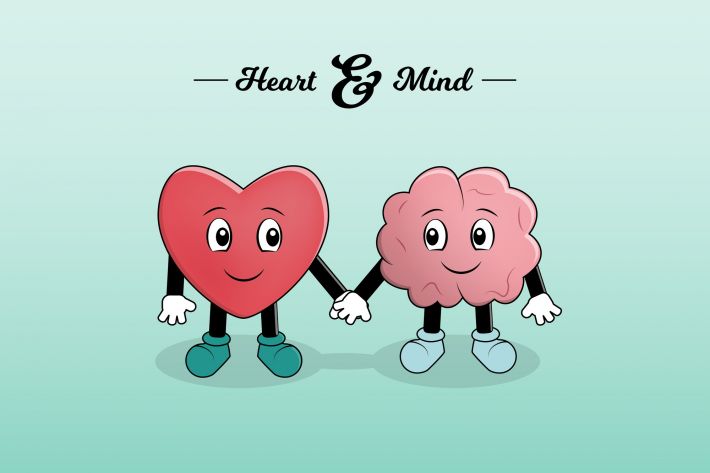
What does the heart want?
Is it love or lust?
Is it anger or joy?
What makes us happy?
People often ask these questions for answers to their emotional problems. Emotional disorders affect millions of people worldwide, and they include depression, anxiety, bipolar disorder, schizophrenia, obsessive-compulsive disorder (OCD), post-traumatic stress disorder (PTSD) and borderline personality disorder (BPD).
There are several theories about why emotions exist. Some believe they serve a purpose, helping us adapt to our environment. Others say that emotions are biological responses to external stimuli.
Regardless of the reason, emotions play a significant role in human life.
The state of our mind often impacts our moods, thoughts, behaviours, and decisions.
What happens to our emotions once we die?
Is there an afterlife in heaven or hell?
The idea of living forever has fascinated us since ancient times. In fact, numerous religions around the globe believe in some life after death.
Buddhism believes in reincarnation, where a person lives multiple lifetimes before being born into another body.
Christianity teaches that humans will live in heaven or hell, depending on their actions during their lifetime.
Islam also has similar beliefs about eternal life.
There are only two types of theories about what happens to human consciousness upon death. One idea says that the mind continues to exist without a body, while the other states that the spirit leaves the body and enters into the next level of existence.
These concepts are often called dualism or materialism. The former holds that matter is the sole reality, while the latter suggests that there is something immaterial called a soul that exists apart from matter.
You aren't at the mercy of your emotions -- your brain creates them | Lisa Feldman Barrett
Can you look at someone's face and know what they're feeling? Does everyone experience happiness, sadness and anxiety the same way?
What are emotions anyway? For the past 25 years, psychology professor Lisa Feldman Barrett has mapped facial expressions, scanned brains and analysed hundreds of physiology studies to understand what emotions really are.
She shares the results of her exhaustive research -- and explains how we may have more control over our emotions than we think. Check out more
TED Talks: http://www.ted.com Above.
The 6 Types of Basic Emotions and Their Effect on Human Behaviour | basic emotions psychology.
There are many types of emotions that have an influence on how we live and interact with others. At times, it may seem like we are ruled by these emotions.
The choices we make, the actions we take, and the perceptions we have are all influenced by the emotions we are experiencing at any given moment.
Psychologists have also tried to identify the different types of emotions that people experience. A few different theories have emerged to categorize and explain the emotions that people feel.










[…] often misunderstood issue. It can be difficult to identify and understand the full range of emotions and experiences that can make up our mental health. […]